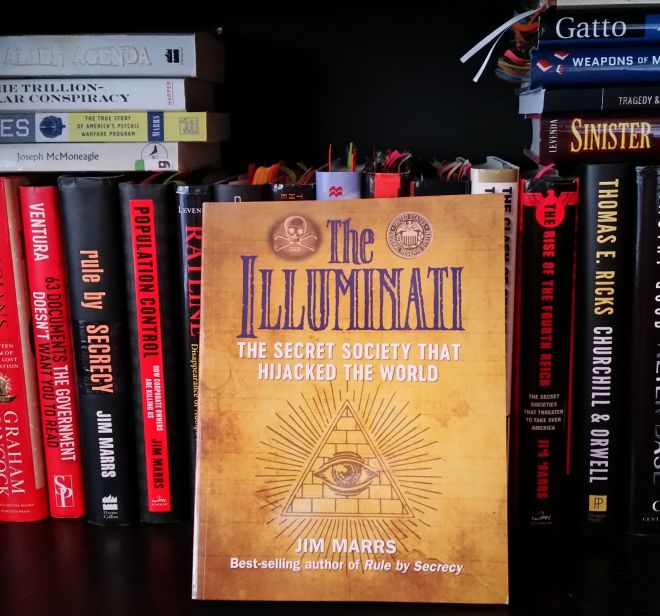
TheBreakaway | BreakawayConciousness
Zy Marquiez
June 14, 2017
“We know where you are. We know where you’ve been. We can more or less know what you’re thinking about.”
– Former Google CEO Eric Schmidt
“You had to live—did live, from habit that became instinct—in the assumption that every sound you made was overheard, and, except in darkness, every movement scrutinized.”
—George Orwell, 1984
Over the last decade, American has been sinking deeper and deeper into a totalitarian landscape. Battlefield America by John W. Whitehead not only catalogues many of the tyrannical events that should have never taken place against the populace in America, but soberingly warns about the further incoming tyranny that’s slowly seeping in America and will certainly continue if the people don’t wake up to these.
The overall pattern of tyranny in America has been covered by much of the alternative media, but rarely the mainstream media. That’s why a book like this is so important, because it brings clarity to such a sobering and disconcerting topic.
That said, what does the “Police State” encompass? For starters, it involves hyper-criminalization of many events. How do we know this is taking place? For incisiveness and accuracy, let’s cite the author in his own words:
“…it is estimated that the average American actually commits three felonies a day without knowing it. In fact, according to law professor John Baker, “There is no one in the United States over the age of 18 who cannot be indicted for some federal crime. That is not an exaggeration.”[1][Bold emphasis added.]
Such is the foundation of a tyrannical police state.
Citing dozens and dozens of examples, the author catalogues a Marine having been detained for criticizing the government on facebook, a reporter persecuted for not revealing his sources, many instances of SWAT teams bursting into homes unannounced to investigate minor crimes [or sometimes none at all!], and more. Examples of police brutality are also covered, as well as invasive searches with no warrant where they have stripped searched people, drawn blood, probed people intimately, charged people for feeding crows, charged individuals for living off grid, charged others for watering a neighbor’s yard, or for installing solar panels, or raising chickens in the back yard, and even carrying out the heinous crime! of growing vegetables. It is no coincidence that much of what the government has criminalized are things that allow self sufficiency to individuals. Self-sufficient individuals take care of themselves and rarely if ever need the government. The less and less people need government, the more the Government power seeps away. It’s a simple formula. As such, forcing people to tyrannically have to be dependent on the corrupt system is part of the plan. It’s crystal clear.
And yet, do we really need all of this policing? The number of violent crimes in the country is down to the lowest rate in 40 years.[2] Violent crimes are going down, but the power of the police continues to increase. That’s called a paradox. That’s the opposite of what should be taking place.
As the author notes:
“You are 17,600 times more likely to die from heart diseases than from a terrorist attack. You are 11,000 times more likely to die from an airplane accident than from a terrorist plot involving an airplane. You are 1,048 times more likely to die from a car accident than a terrorist attack. You are 404 times more likely to die in a fall than from a terrorist attack. You are 12 times more likely to die from accidental suffocating in bed than from a terrorist attack. You are 9 more times likely to choke to dean in your own vomit that n die from a terrorist attack. You are 8 times more likely to be killed by a police officer than by a terrorist.”[3]
Even actual police officers are more likely to harm individuals than terrorists – that’s an incredibly frightening prospect, and one that is oft-overlooked in the age of distraction and sound-bites.
In conjunction with that, the desensitization of the police state is also covered by the author. As the author notes, TV shows, movies and video games, accustom the mind to seeing a police state as normal, while schools now criminalize child behavior, all of which is leading to the next generation seeing as normal something that the founding fathers clearly warned about. To the next generation growing up in a police state will be normal because that is all they have ever known. That will make this disturbing trend even harder to reverse.
Battlefield America also delves into the ominous growth of Big Brother and it’s endless surveillance machinations. From the ubiquitous presence in spying by the NSA, as well as the disturbing connection between Google and the government in facilitating spying on citizens, the author sifts through a wide range of modalities that are employed against the populace.
Also exposed is coming age of drones (that will also aid in spying, by the way), which has already begun, and also the ceaseless growth of DHS. The enormous scope of the Big Brother & Police State expansion covered by the author branches far and wide showing, and it shows many of the components that undergird such this growing totalitarian system.
The author even goes on to juxtapose the current pattern of tyranny with similar patterns in history, while also drawing parallels from fiction such as 1984 and Brave New World.
Comprehensive in its aim, and disturbing implications, this is a book that should be read by everyone. The Police State affects all of us, and it’s only going to get worse given the complacency and ignorance that a sizeable portion of the population retains. Whatever future manifests, it will come about through the action, and inactions of individuals from all over. If you value freedom, you should ponder about this issue, because not only does the system already show everyone as a criminal (remember the first quote), but worse, history has shown, time and time again that those that value freedom, and yet don’t act to keep their freedoms end up in a life of servitude.
___________________________________________________________
Footnotes:
[1] John W. Whitehead, Battlefield America, p. 3.
[2] Ibid., p. 63., citing Richard A. Oppel Jr. “Steady Decline In Major Crime Baffles Experts,” The New York Times (May 23, 2011), http://www.nytimes.com/2011/05/24/us/24crime.html
[3] Ibid., pp. 43-44.
___________________________________________________________
If you find value in this information, please share it. This article is free and open source. All individuals have permission to republish this article under a Creative Commons license with attribution to Zy Marquiez and TheBreakaway.wordpress.com.
___________________________________________________________
About The Author:
Zy Marquiez is an avid book reviewer, inquirer, an open-minded skeptic, yogi, and freelance writer who studies and mirrors regularly subjects like Consciousness, Education, Creativity, The Individual, Ancient History & Ancient Civilizations, Forbidden Archaeology, Big Pharma, Alternative Health, Space, Geoengineering, Social Engineering, Propaganda, and much more.
His other blog, BreakawayConsciousnessBlog.wordpress.com features mainly his personal work, while TheBreakaway.wordpress.com serves as a media portal which mirrors vital information nigh always ignored by mainstream press, but still highly crucial to our individual understanding of various facets of the world.








